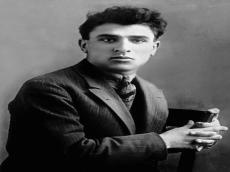|
|
TODAY.AZ / Society
Youngest romantic of Azerbaijani poetry: Mikayil Mushfig
31 January 2022 [13:00] - TODAY.AZ

By Azernews
By Vugar Khalilov
His genuine, delicate and sincere poems and his unconditional love for the Motherland make Mikayil Mushfig a contemporary of all generations captivating the hearts of readers with charm.
Mushfig deeply loved the Azerbaijani folklore, classical literature and was one of the most consistent supporters of learning from their good traditions by developing them in the new conditions.
The poet wrote on the never-ending, inexhaustible themes of literature such as human feelings and love by mastering new artistic descriptions.
Mushfig was a poet who created new poetic forms and always was on the lookout for appropriate poetic forms and artistic expressions in his colorful, meaningful poetry.
It is impossible to imagine modern Azerbaijani poetry without Mushfig and this will continue to be the case in the future as well.
Biography
Mikayil Ismayilzade (Mushfig), a prominent representative of Azerbaijani literature, was born on June 5, 1908, in Baku. His family came from one of Azerbaijan’s most beautiful Khizi region. At an early age, the poet lost both parents, and his upbringing was greatly influenced by his grandmother. As a child, he learned many tales, legends, folk poems and songs from her.
Mushfig received his primary education at the Russian-Tatar school before the Russian revolution and graduated from the language and literature faculty of the then Azerbaijan State University (now Baku State University). He began his career as a teacher at the Baku secondary school No. 18, which is now named after him.
Mushfig began his poetic career in 1926 with the poem "One Day" published in the Young Worker newspaper. He later wrote unforgettable poems, stories, was seriously engaged in literary translation and regularly appeared in periodicals.
In 1931, he married Dilbar Akhundzade. As a result of the Soviet government's repression of Azerbaijani intellectuals in the 1930s, the poet was arrested in 1937. On January 8, 1938, he was sentenced to death as a result of a brief kangaroo court.
Patriotism and poetry
It is enough to take a brief look at Mushfig’s life to find out how this great person was connected to the Motherland, statehood, national and spiritual values.
When the teaching of tar, one of Azerbaijan’s national musical instruments, was banned at the National Conservatory, Mushfig protested the decision by writing his famous poem about tar that glorified it.
Mushfig always wanted to see Azerbaijan prosperous, independent and free. He dreamed of its independence, welcomed the establishment of the Azerbaijan Democratic Republic (1918) and wrote beautiful poems on this occasion.
Mushfig expressed his dreams in his poems. This later gave a pretext to the Soviet government to eliminate him.
Mikail Mushfig's personality was an example of national consciousness and patriotism, and his creativity was an invaluable treasure in the development of the national self-consciousness of the young generation.
With his poems, he managed to write his name in golden letters in the history of Azerbaijani poetry. While reading Mushfig's poems, it seems that he developed a concept for the education of young people. The youth, who benefit from his poems about the homeland, mother, and lover, can only become a good person. The special attention paid to women in his poems shows how exalted they are for humanity. Sons who understand these poems not only learn to love their homeland and mother, but also to respect women.
This spiritual upbringing teaches a person to feel the most sublime, the most romantic, and the most sacred feelings. Probably, one of the main reasons why Mushfig's poems were loved by all generations, especially young people, was his ability to catch the pulse of youth.
Mushfig's poem "Mother" is likely one of his most influential. One cannot help but be surprised as one reads each verse of this poem. Mushfig, who lost his mother when he was two months old, describes her in the poem "Mother" in such a way that a poet who lived a long life and grew up with his mother's caress all his life could not even sing "mother".
Indeed, morality plays a significant role in the development of any country. Young people's primary responsibility is to study the spiritual heritage entrusted to them and to educate their souls with that spiritual heritage.
The more we read the poems of poets like Mushfig and educate the next generation in this spirit from childhood, the more we can ensure a healthy future for them and society.
Despite his 30-year short life, Mushfig left behind a real poetry treasure for the Azerbaijani people.
It should be noted that a bust to immortalize Mikayil Mushfig was erected in Baku, and a school, street, and square were named after him.
URL: http://www.today.az/news/society/215041.html
 Print version
Print version
Connect with us. Get latest news and updates.
See Also
- 03 February 2026 [19:45]
bp commemorates Magsud Ibrahimbayov’s birth anniversary - 03 February 2026 [15:04]
State border service detains violators, seizes narcotics and contraband in January - 02 February 2026 [13:16]
Number of myGov ID users surpasses 5 mln in 2025 - 02 February 2026 [12:20]
Azerbaijan’s Parliament approves changes to Preamble of Nakhchivan Constitution - 02 February 2026 [11:20]
President Ilham Aliyev addresses Azerbaijani youth on occasion of Youth Day - 02 February 2026 [11:16]
11th Azerbaijan Youth Forum opens in Baku on Youth Day - 02 February 2026 [10:22]
France hosts International Transport Forum (ITF) corporate partnership board week - 02 February 2026 [09:12]
President Ilham Aliyev makes post on Day of Azerbaijani Youth - 02 February 2026 [09:11]
First Vice-President Mehriban Aliyeva makes post on Day of Azerbaijani Youth - 31 January 2026 [17:35]
Writer’s House hosts inaugural ‘Yüks?li?’ series on Azerbaijani language and ideology
Most Popular
 Pakistan says 48 killed in coordinated attacks in Balochistan
Pakistan says 48 killed in coordinated attacks in Balochistan
 US moving forces into Middle East - What comes next with Iran?
US moving forces into Middle East - What comes next with Iran?
 The army is being taken away from Etchmiadzin
The army is being taken away from Etchmiadzin
 Slovakia PM adviser quits after Epstein messages surface in newly released US files
Slovakia PM adviser quits after Epstein messages surface in newly released US files
 Zangezur corridor become part of TEN-T: European Union is joining fight for South Caucasus
Zangezur corridor become part of TEN-T: European Union is joining fight for South Caucasus
 Grain, fuel and politics of peace: How trade redrawing Armenia–Azerbaijan relations
Grain, fuel and politics of peace: How trade redrawing Armenia–Azerbaijan relations
 From sanctions to strategy: Europe joins Washington in confronting Iran
From sanctions to strategy: Europe joins Washington in confronting Iran
